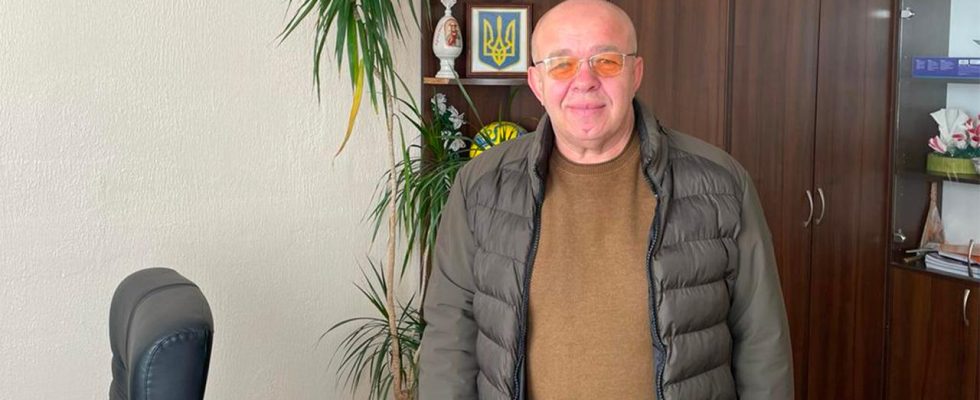Concern is growing in Ukraine that support in the West could weaken. In addition to military support, the country continues to need humanitarian assistance. A project from Neuss shows how this can work in a targeted manner.
Serhii Olijnik walks down the narrow hospital corridor, past rushing staff and waiting patients. He enters a small room. This is almost empty – except for a device equipped with a monitor and probes. Olijnik looks at it with visible joy: “Look, it’s practically ready for use. It helps to examine internal organs. Although, I see, the printer paper is sticking out a bit. Well, I’ll take a look at it later.”
Olijnik is director of the civil municipal hospital in Pavlohrad in southeastern Ukraine. The new ultrasound machine comes from Germany. It was only recently delivered – as part of a bilateral aid project. The hospital can also look forward to further donated medical equipment, as surgeon Olijnik says: “We received three ultrasound machines. Plus two mobile X-ray machines, two incubators, two patient monitors. All of this is urgently needed, both in the intensive care unit and for the hospital Care of premature babies in the maternity ward.”
Olijnik invites you to take a tour of the departments and chat with doctors and nurses. In general, the hospital is not poorly equipped. But Russia’s invasion has made the situation worse, also because Pavlohrad’s role has changed. Instead of the previous 100,000, there are now around 150,000 people living in the city, many of whom are internally displaced people.
Medical state of emergency – every day
It is around 150 kilometers to the front in the east. Military vehicles are constantly rushing through the city. This affects the work in the hospital, says director Olijnik: “Psychologically alone, it’s worse. You never know what the next day will bring. If you wish someone good health, you say: ‘I wish you stability’. This stability is missing “It’s been two years now. You see a lot of dead people, people without legs or arms, and you have to keep living somehow.”
Wounded soldiers, for example, have to do this. There are a lot of them, says Olijnik with a serious expression. If they were treated in Pavlohrad, they would often no longer be fit to fight. In addition to the general psychological stress, there are risky working conditions: “There are often air raid alarms. But we can’t afford not to work. Sometimes it’s not possible to bring patients into the basement. We therefore usually use the two-wall rule “You can’t just interrupt operations or births.”
In this extreme situation, the hospital in Pawlohrad is receiving support from North Rhine-Westphalia. The “Neuss Helps” association initiated the delivery of the medical devices. Their spokesman Max Lennertz explains the background: “The project in Pavlohrad came about because we worked very hard last year for a town twinning between Neuss and a city in the Ukraine. Mainly in the Dnipropetrovsk region, which is the partner region of NRW. We exerted a bit of pressure on different levels. And the result was a solidarity partnership.”
Providing help more specifically, quickly and effectively
Since the beginning of the Russian invasion, such partnerships have become more and more common. “Neuss helps” fills it with life, says Lennertz. The association has a lot of experience in voluntary humanitarian aid and a large network. Some projects are promoted with videos on social networks.
A friendly social enterprise organized the medical equipment for Pavlohrad. The exact need was previously determined between the cities of Neuss and Pawlohrad. The transport to Ukraine also went smoothly. Lennertz therefore considers solidarity partnerships to be a good concept: “The basic requirement is that such a city partnership is taken seriously. And so humanitarian aid can possibly be implemented more specifically, quickly and with more effectiveness,” he says.
But Lennertz is also thoughtful. Overall, the willingness to help in Germany is decreasing, he observes. He is also concerned about the tense political atmosphere and the rise of the AfD. At the same time, he reminds us of the extremely dangerous everyday life in Ukraine, for example in view of the constant threat of air strikes: “Yes, I can understand that citizens are dissatisfied. That they are worried about the rising cost of living. Nevertheless, I keep saying: As long as we “We can go to bed without worrying about not surviving the night, we’re doing damn well.”
“We want Ukraine to become a normal country”
At the municipal hospital in Pavlohrad, director Olijnik appreciates the support from Neuss. He says, almost touched: “You know, words alone aren’t enough. In Germany they could have said – ‘Well, you’re fighting over there, but please without us.’ But people help us. I thank them very much for that. If I could, I would shake everyone’s hand and hug everyone.”
After almost two years of the Russian invasion, the surgeon is also exhausted. Nevertheless, he tries to exude confidence. And states his wish for the future: “We are not in a feudal system and do not want to wage wars of conquest. We want our Ukraine to become an independent, prosperous and normal European country.”
Peter Sawicki, ARD Kiev, tagesschau, January 19, 2024 8:32 p.m

